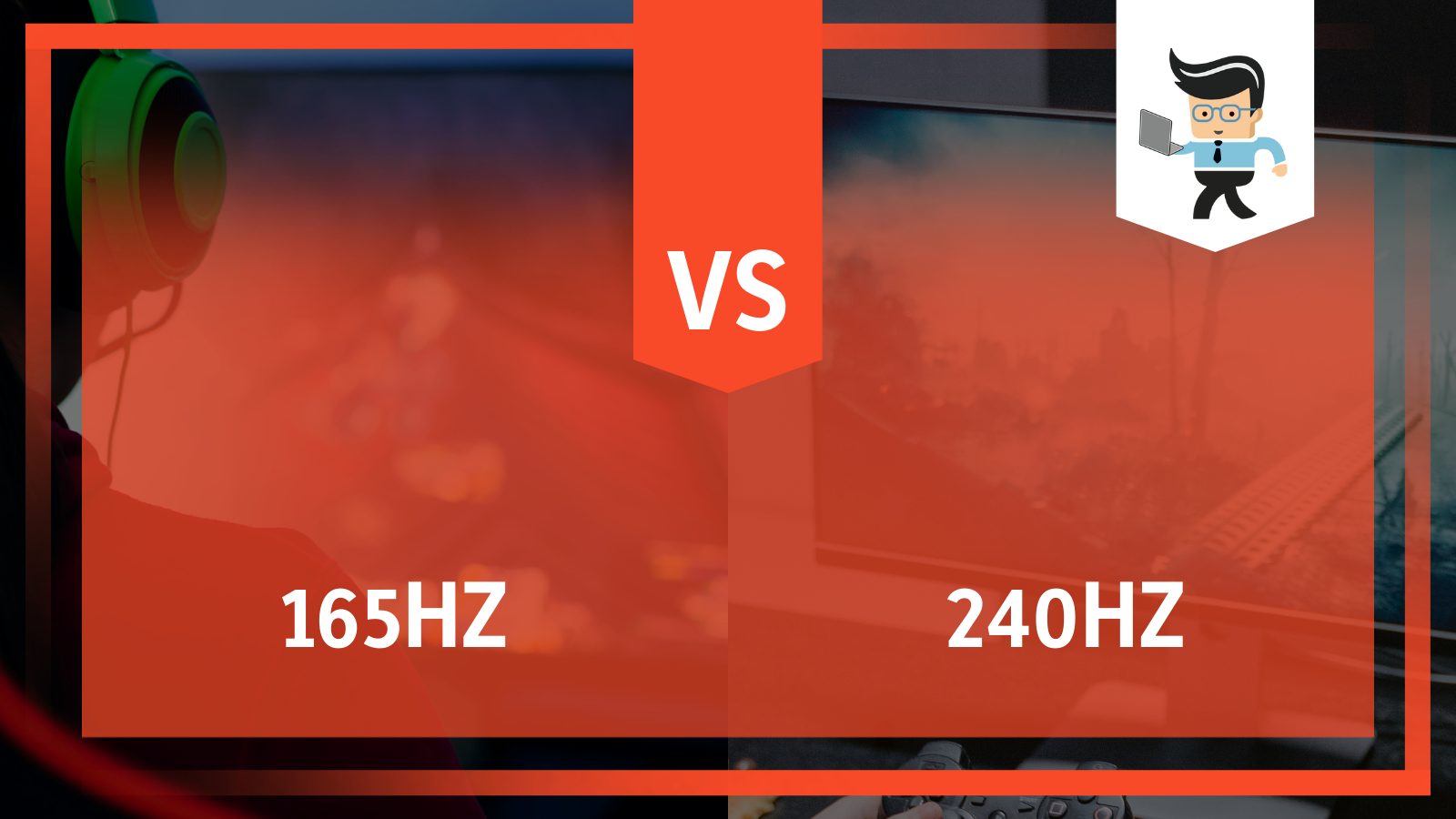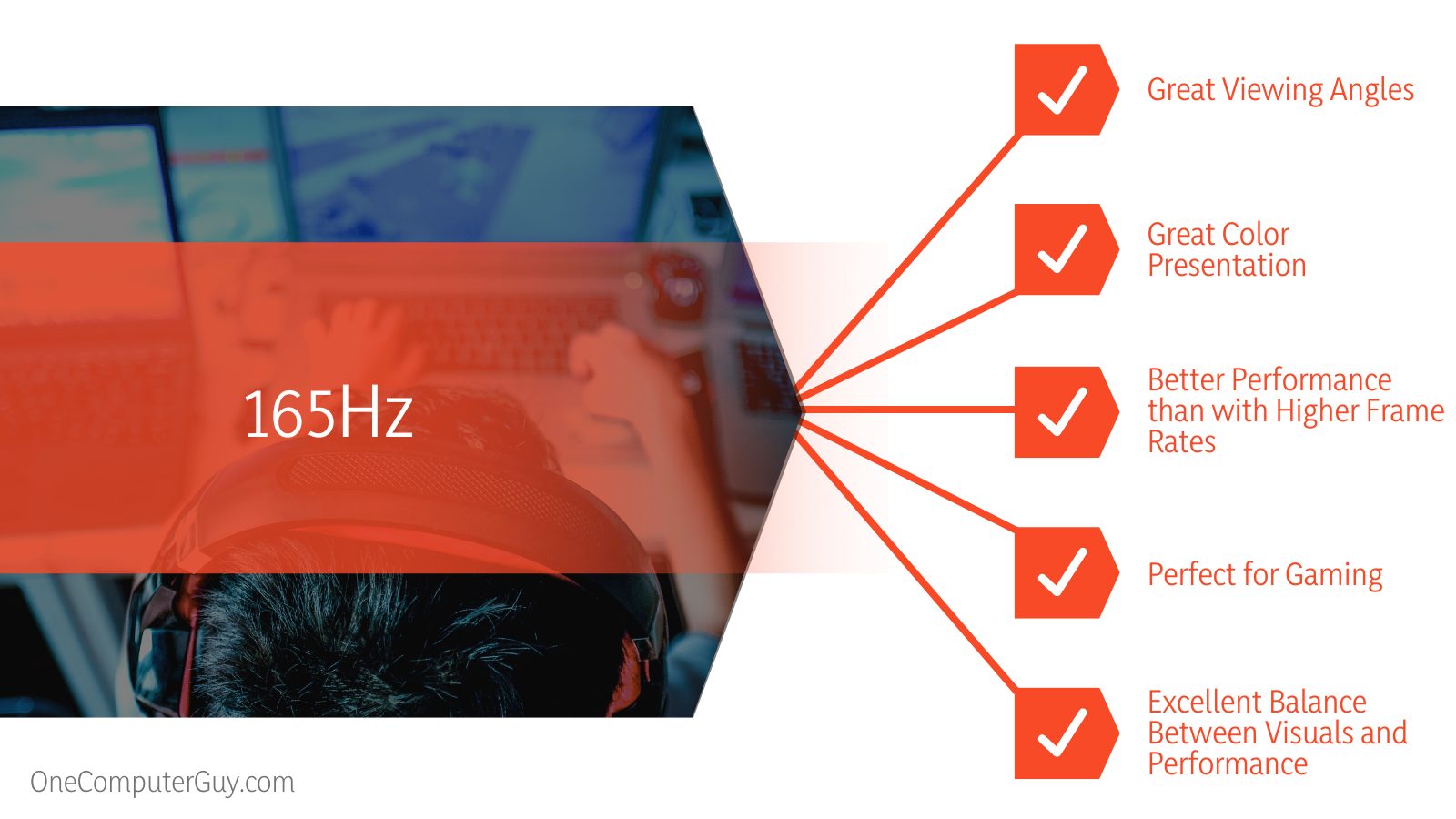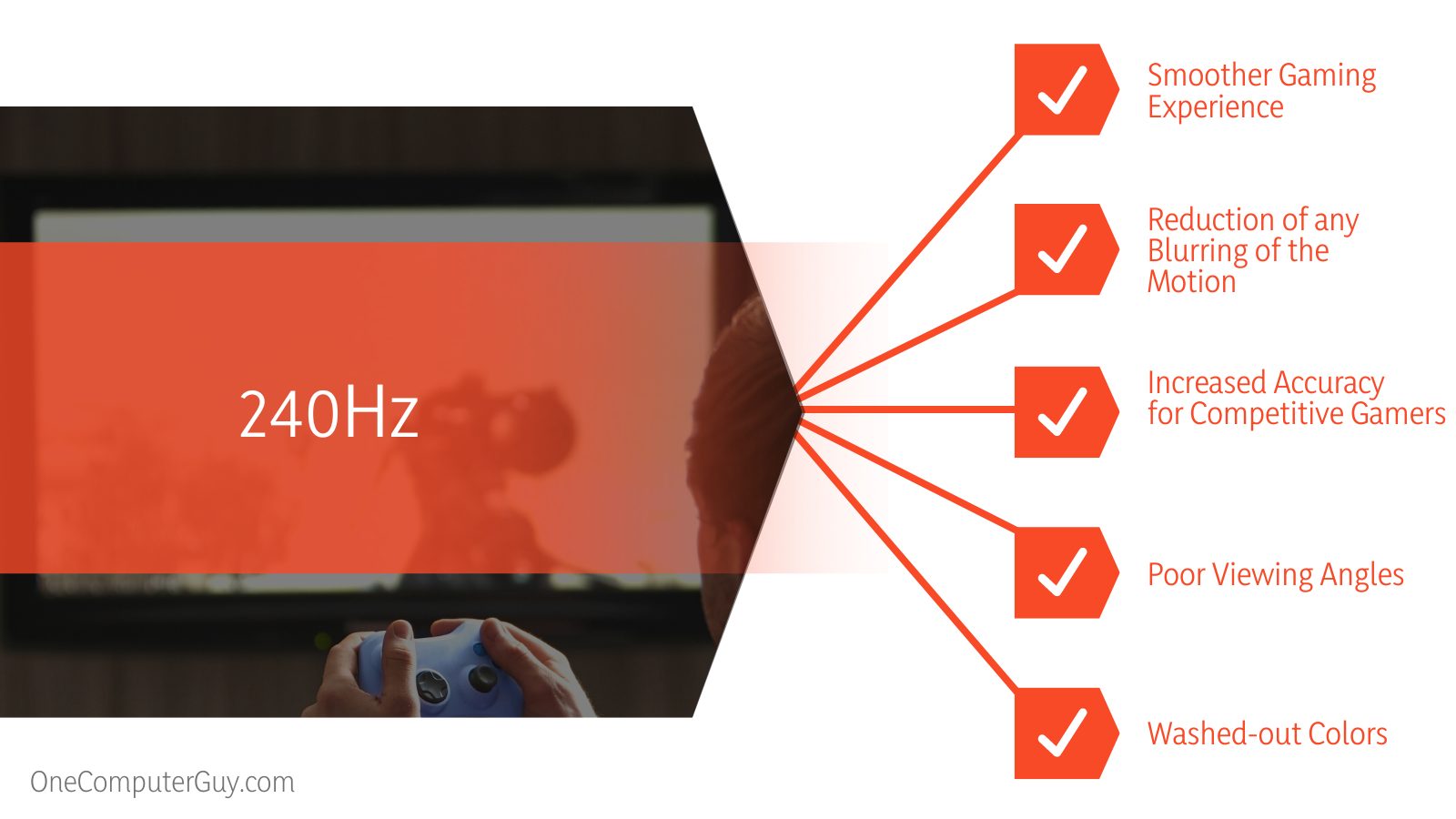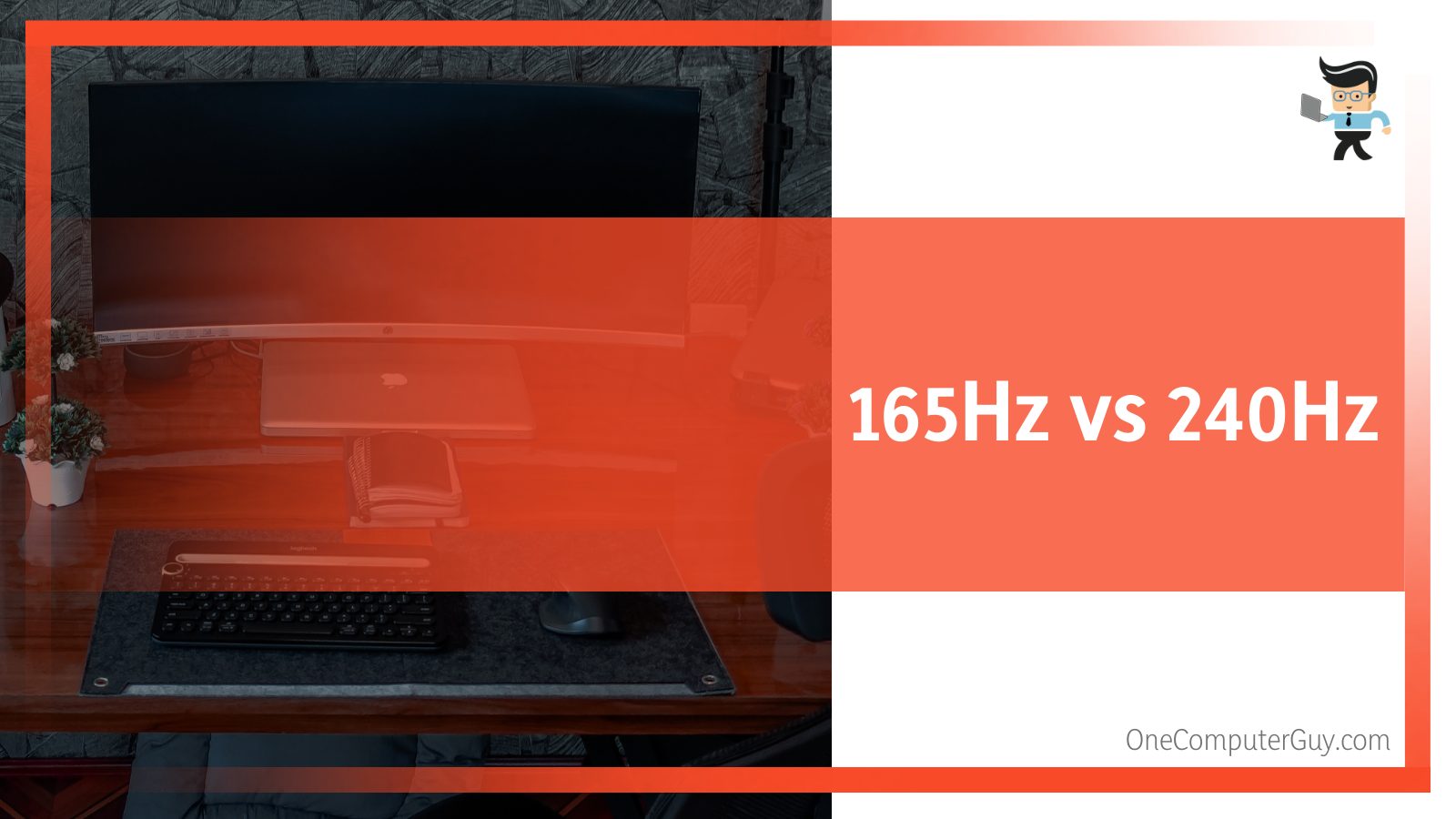Which one, 240Hz vs. 165Hz, will better meet your requirements? Before buying a monitor, you need to know its refresh rate. This review will explain the difference and help you to reach a decision.
Contents
 240Hz
240Hz
Pros |
Cons |
| A smoother and more fluid gaming experience, with increased responsiveness. | Uses a TN panel, which offers limited visual quality |
| A reduction of any blurring of the motion. | Washed-out colors |
| The possibility of faster reaction times and increased accuracy for competitive gamers. | Poor viewing angles |
Most gaming monitors stick with 144Hz, but some push the envelope to 240Hz. The higher the framerates go, the harder it is for the human eye to see the difference. Very few people can tell the 165Hz from the 240Hz refresh rate. You also need a graphics card powerful enough for such a high framerate.
The benefit of such a high framerate is performance. A 240Hz monitor is the best deal for a competitive gamer who needs every advantage available. Still, you will need to choose between performance and visuals.
-
Overview:
The 240Hz monitor is for the competitive gamer. If you prefer visuals, a VA or IPS panel will serve your needs much better.
165Hz
Pros
- You can enjoy great viewing angles and color presentation.
- It provides the right combination of screen resolutions and high refresh rate
- You get better performance than with higher framerates
A 165Hz monitor is an obvious choice for the gamer who doesn’t want to settle for anything mediocre. These monitors are also suitable for home and work-related purposes.

-
Overview:
The 165Hz monitor is perfect for gaming. It offers an excellent balance between visuals and performance.
Buying Guide
When buying a monitor, many factors can influence the decision. One may think of size, sturdiness, color, or how crisp the display looks. The display rate, which is the number of times the monitor updates with new images each second, might be the most critical factor for consideration.
In other words, the refresh rate is the maximum number of Frames per Second (FPS) that the monitor can display. So, what are the benefits of high refresh rates? What the advantages of a high frame rate? And why is the display rate so important?
It all depends on the use of the monitor. If you plan to use a monitor to view movies, then a refresh rate as low as 60Hz will do. Most films use 24 FPS. It means that higher refresh rates will not make any difference.
Now, using the monitor for games is a whole different ball game. Here is where the refresh rate matters.
We measure the refresh rate in Hertz (Hz). It’s how many frames per second your monitor can reload. It’s the rapid refresh of still images, which gives the illusion of movement to the eye. You might see a solid visual on a screen, but they cannot see how the screen is changing 240 times per second. With higher refresh rates, the images on the screen appear smoother.
Let us be clear on what frames per second are. Imagine wanting to convey the idea of a figure running. You make several drawings at different stages of the movement. When each picture or frame is shown at a speed of 24 FPS, it appears as motion.
When you display more frames in one second, it makes the movements appear to be smoother. The graphics card in your computer is what determines the frames per second. It also makes your screen look better.
What difference will a refresh rate of 165hz or 240hz make to you? The standard monitors in an office or at home would usually have a 60Hz refresh rate. In recent years, monitors with faster refresh rates are becoming more available. They have also become more affordable. As you can see, there are now monitors with 120Hz, 144Hz, and 240Hz refresh rates.
The average person uses a monitor in an office for word processing, email, and other work. They might not know the difference. Especially at higher rates, the difference will not be noticeable. For experienced gamers, though, they are usually able to tell the difference.
Another thing to consider is the refresh rate of the monitor you are currently using. Are you seeking to replace a 60hz monitor, or are you upgrading from 144hz? The bigger the difference between the two numbers, the more pronounced the difference will be. Thus, it will be more noticeable.
What’s the Difference Between 144Hz and 165Hz?
The main difference between 144 Hz and 165Hz and 240Hz is, the higher refresh rate enables gamers to manage games that require a high visual display, so it comes down to preference.
Refresh rates of 144Hz or 165Hz are excellent for any gaming monitor. You’re on the right path with these refresh rates if you need a high-spec monitor. It’s the only way to enjoy your gaming experience. It’s exasperating to play when your monitor keeps showing blurred images. You’ll need the 144Hz and 165Hz refresh rates to sustain the high image resolutions on which you’re playing.
The perfect refresh rate on a gaming monitor is one of the most complicated topics. It always depends on the individual gamer’s personal opinions. It’s important to note that in modern times, the best monitors for gaming start at 165Hz. This refresh rate enables them to manage games that require a high visual display.
Imagine you’re in the heat of gameplay, and you die because your screen stutters a little. It takes only one second to bite the dust. Such a loss can be maddening. You don’t have to worry about that happening with a refresh rate of 165Hz.

Why is a Higher Refresh Rate Better?
When looking at a screen, we see moving images, and everything appears to be flowing smoothly. What may not be easy to tell is that the pictures on your display are changing at an incredible rate every second. As we said earlier, this may not matter much while enjoying a movie. For a competitive gamer, it can determine if they hit or miss.
When the screen refreshes more often, it results in a smoother and more fluid movement of the images. They are less jerky. This progression of events may be unimportant to the average user. The competitive gamer needs this smoothness to help improve accuracy. It takes the game to a higher level.
So, the high refresh rates are of little or no interest to the person using the monitor at home or in the office. But, it’s essential to graphic and gaming professionals.
We spoke to people who use a 60Hz monitor, who then played on a 144Hz. They can immediately notice a positive difference in their skills. Going to 240hz would see even more dramatic improvements. Lots of professionals are switching from 144Hz and 165hz to 240hz.
We have written at length about the refresh rate and frames per second. We reiterate that the higher the number, the better it should be.
If you don’t have a graphics card to support that speed, then the high refresh rate will not benefit you. Your graphics card can push as many frames per second as it likes. But, the monitor cannot display more than the maximum determined by the refresh rate. That’s because it will cap you at whatever that lower specification is.
So we recommend that you see the specifications for your graphics card. Then decide if you should upgrade that as well or if it is adequate. If you buy a high-speed monitor and your graphics card is pushing a low number of frames per second, it will make no sense.
If money is not a problem, though, we would recommend a 240Hz monitor. You can invest in it for the future. If you can’t make full use of it now, you won’t have to worry about upgrading your monitor. You’ll be ready to game when you upgrade your graphics card and other CPU.
In summary, what your need is, will be the deciding factor. Are you a competitive gamer? Are you a graphics professional? If you are either of these, you need a monitor with a minimum refresh rate of 144hz. One with a 240hz rate is even better. You will not want to see or use a 60Hz for any purpose whatsoever.
Another thing you have to ask yourself is, can my GPU handle the refresh rate. If your GPU isn’t powerful enough, you will not get your money’s worth. So, before making a decision, run some tests on your GPU to see how well it performs.
If you cannot see the difference in refresh rates, does it make sense investing more for the higher speed? There are real differences in the speeds, but you may not be able to see it, based on your experience.
The cost is another consideration. There is a relationship between the price and the speed. The higher the speed, the greater the cost.

Not everyone is a competitive gamer. A less expensive monitor, with a decent refresh rate, would meet the average person’s need. Not only are they more affordable, but few people can tell the difference.
We would recommend 240Hz monitors to people who have capable computers. Remember, you should also have a good graphics card. If you don’t mind investing in the highest refresh rate monitor currently available, 240Hz is the way to go.
Conclusion
Finally, considering everything, we would recommend a 144Hz for most people. It’s more affordable, and the chances are that you will be better able to get the best performance from one.
The 240hz monitor is for a very competitive game player. These players are looking for every little advantage to win. If winning is so important, investing in a 240hz monitor may give you the edge you need. Buy 240Hz to reign in a very competitive gaming environment.







